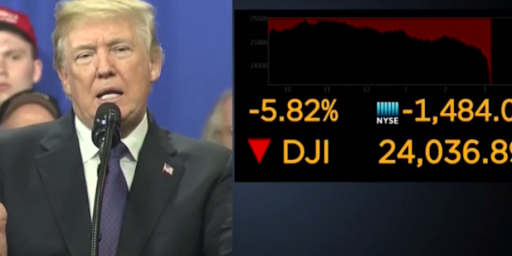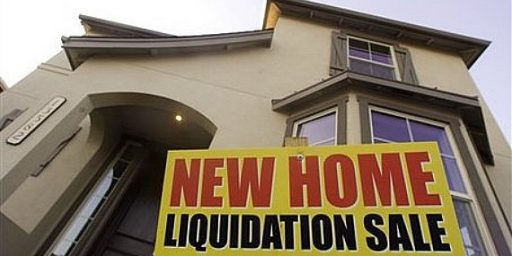Economic Horror Show
And even more bad news.
And the bad news just keeps on rolling in.
“It seems that almost every bit of data about the health of the US economy has disappointed expectations recently,” said Riddell, in a note sent to CNBC on Wednesday.
“US house prices have fallen by more than 5 percent year on year, pending home sales have collapsed and existing home sales disappointed, the trend of improving jobless claims has arrested, first quarter GDP wasn’t revised upwards by the 0.4 percent forecast, durables goods orders shrank, manufacturing surveys from Philadelphia Fed, Richmond Fed and Chicago Fed were all very disappointing.”
“And that’s just in the last week and a bit,” said Riddell.
Pointing to the dramatic turnaround in the Citigroup “Economic Surprise Index” for the United States, Riddell said the tumble in a matter of months to negative from positive is almost as bad as the situation before the collapse of Lehman Brothers in 2008.
“The correlation between the economic surprise index and Treasury yields is very close, so the lesson is that whatever your long term macro views are regarding hyper inflation vs. deflation or the risk of the US defaulting, the reality is that if you want to have a view about government bond prices, the best thing you can do is look at the economic data to see what’s actually going on,” said Riddell.
Isn’t that a pile of good news?
And in the comments to this post commenter ej provides this interesting link on the problem with the stimulus,
1. The “irrationality” is not primarily in the system’s response to the initial financial impulse but in the unsustainable expansion of the housing and other capital markets in the first place. Proposals to prop up the housing market as if its contraction is some kind of unfortunate overreaction are not credible. Too many resources went into the housing market due to the low-interest-rate policy the Fed followed for too long. While housing prices have fallen recently in many markets, they need to fall further. Markets should be allowed to equilibrate.
2. Equilibrium in the housing market would provide greater transparency to the value of mortgage-backed securities. Lack of certainty about housing prices and the ultimate extent of foreclosures only adds to the problems surrounding the illiquidity of these securities.
3. Government infusion of capital with the purpose of restoring the status quo ante ignores the facts: Fannie and Freddie were overexpanded, the domestic automobile industry is a destroyer of scarce capital, some financial firms did a poor job of allocating risk, banks extended loans under the pressure of the government to people who should not own homes, and so forth. Resources were misallocated.
In other words, what we are trying to do is go back to the way things were. But we can’t go back to the way things were because that was not sustainable and that bubble has already burst. We can’t even go back to where we would have been if there had been no bubble because nobody knows what that point is, and even if we did, what happens once we get there? Raise taxes and interest rates? Shrink the money supply? All contractionary measures so be sure and all the people who have been sustained by such policies will likely resist and those people have quite a bit more pull than the American taxpayer when it comes to determining policy.
The above linked article also makes another interesting point confidence follows from a correction. You can’t increase confidence in the economy amongst consumers and businesses by trying to return to a state that is no longer attainable. In fact, if anything you’ll likely reduce confidence and increase uncertainty. Problem is that the pressure is on politicians to do exactly that. Fix it, go back to the good times.






Very much the point I was making about status quo-ist government in my post this morning.
I think it also bears mentioning that the neo-Keynesians’ efforts to boost aggregate demand to pre-recession levels is suspect. It was a bubble!
Steve,
You’re a retard. Go take a political science course that isn’t run by Fox News you flaming idiot.
I suspect that the notion that the efforts were aimed at returning to the status quo ante is merely a convenient strawman. I think it far more likely that most of the intervention was aimed at halting the downward spiral, and preventing some of the collateral damage, to individuals and industries, that the financial crisis would have wrought.
I think it is true that, for instance, though the auto industry had massive self-inflicted problems, the crisis that put them on the edge of bankruptcy was not their fault, was not a part of any normal business cycle. To have stood by and let two of the big three, and likely the related parts industry go down, with all the job losses and other damage that would have wrought, would have been madness – downright Republican.
Thats not trying to return to some status quo, its a forward looking attempt to limit collateral damage and establish a sound footing for the economy going forward.
Tax cuts fot the rich!!!!!!!!!!!!!
Steve, post again when you actually have a new idea. If “free markets” actually worked, Repubs would have been eliminated a long time ago.
It’s a pity the Republicans were given control of the House because they promised America they’d fix the economy, I guess.
Well if we had a free market, we could test your claim. Unfortunately, our markets are highly regulated and they have been for centuries.
oh Ponce, there you go again. Repubs are to blame for everything. Do you have an original idea?
As someone that would have been directly affected had 2 of the big three gone under, I’m glad the government did what it did.
Karl Smith notes that manufacturing jobs are worse off for longer than most realize.
http://www.washingtonpost.com/blogs/ezra-klein/post/manufacturing-collapse/2011/06/01/AGTFhSGH_blog.html#pagebreak
Steve
For all you super smart people, give this a try for some enlightenment: http://blog.atimes.net/
Remember, it is all Bush’s fault. Just keep saying that to yourself over and over. Before you know it, you really will start seeing proud unicorns bearing the union label coming to the rescue of the stupid masses who said Obama was an inexperienced,anti-capitalist fool way back in 2008.
The mighty Buuuuuuuuuuush strikes again!
Democrats are fools. Or just gullible. Who knows which. Who cares.
Hmmm, I looked but didn’t see that in my post.
Don’t see this either. And given that I’ve been commenting that I’m actually in favor of a combination of tax increases and spending cuts you are letting your ideology blind you.
I think even this is suspect. The idea is that there is some level below which things shouldn’t go…but what is that level? Nobody knows. They want to “stop the descent” that is at best a modified status quo ante position, IMO. Okay, the bubble burst, so lets try to stop it at the half way point (or whatever point you think is good).
I’m sorry, but this is very much a status quo ante position. We have to keep 2 of the big 3, who have implemented bad policies for years, in place.
Proof of the phrase Dave Schuler often uses, “when you rob Peter to pay Paul you can always count on the support of Paul.”
Ya know, Steve, when I read your piece, my first thought was that someone was going to suggest that you were a racist since you are pointing up the massive failures of the current administration. The word racist hasn’t come up yet, but since the “Fox News” gambit’s been played already , the charge of racist cant be far behind.
The plans of the Democrats, Obama included have been a massive, economy -hemorrhaging failure… and there is no escape for the left on this. Welcome to hope and change.
As an example…. 2 of the bog three, allow me to point out thatthe horrendously bad policy they followed were due to the combo of an oversize government, and unions… both leftist institutions.
Welcome to hope and change.
Its amazing how quickly this has become an argument about which party is responsible, considering that both parties are at least 45% at fault and only the remaining 10% is left unassigned. Changing the party in power won’t change anything, because they govern almost exactly the same – the partisan comments are about team sports, nothing more.
Nations fail when the arguments become about who should govern, rather than about how to fix things.
No one sensible expected a return to the status quo, and so for them (us), suggestion that this is what the stimuli were supposed to buy is going to ring hollow.
No, optimists probably thought the stimuli could trigger a new//different growth cycle, while the pessimists might have only hoped that they’d stall any outright downward spirals.
Certainly when we’ve had things as unique and transforming as the internet boom and the housing boom … no one expects a “status quo” return to the same.
Attempting to reinflate a bubble would indeed be a poor choice. But I hardly think that was the idea. The idea was to pull us back from the abyss. First by bailing out the financial system with TARP (under the Bush administration but with Obama & Co.’s buy-in as I recall), which sucked, since they’re the ones who screwed things up in the first place. Second by attempting to stimulate demand. I say attempting because the federal stimulus (which certain folks have argued was too small – Krugman for instance) seems to have been at least partly eaten up by the opposite policy on the part of state governments. Lots of states have balanced budget requirements, forcing cuts. So the feds basically plugged holes, temporarily, in state budgets. Not that this should have been a surprise to any policymakers.
I think we’d have been far better served had all the money spent on stimulus (including the 1/4 or 1/3 of it that was a tax cut) had been spent on a WPA 2.0. But there was no political will for such a thing. The Dems, as usual, were timid and went for a half-measure.
Even had they had guts, it’s pretty hard to magically undo the sort of financial crash we had. The pre-crash status quo was a bubble, after all. A lot of wealth was wiped out because, at the end of the day, it was fictional. But they could (and obviously IMO should) have done more about employment. Sadly, had the GOP been running the show we’d probably have ended up with even worse policy, hard as it is to imagine now. This is the party, after all, that voted repeatedly to increase spending (the wars, medicare part D), decrease revenue (tax cuts), and refused to make any cuts to pay for it. Then, when the Dems did healthcare reform and partially funded it via a cut to Medicare advantage, the same people used that to help win an election (the Dems cut your medicare!). The *very same people* are now attempting to convince us that they are fiscally responsible.
The only response to that should be snorts of derision and laughter.
I think we’re in for a “lost decade” ala Japan, for basically the same reasons they suffered theirs. Too much debt (household, muni, state, federal). Basically our whole society has to de-leverage. That’s gonna take time.
im not sure where the hysterics come into play here. obviously, we should have learned that inflating bubbles for short term growth leads to long term disaster. everything else really is just partisan sniping, and its embarrassing.
Read the link, Rizzo talks about that too, although I think this claim is arguable. Here I’ll quote Rizzo so you don’t have to click through,\
George,
Well said. I don’t think Obama has done anything wildly different than Bush would have done (assuming he got a third term) or McCain had he won. Sure McCain would probably push for income tax cuts and in the end we’d end up with a ginormous public debt like we have now. If the tax cuts are seen as being largely temporary their impact on consumer behavior would be minimal (i.e. people might tuck the money way for later, or pay down debts vs. buying consumer goods). And the Fed being largely autonomous would be doing what it is doing.
We are in lots of trouble, and partisan bickering will not help.
And all this talk of “pulling us back from the abyss” is great rhetoric, but that is status quo ante rhetoric. The basic idea is to stabilize the economy. As Rizzo put it,
CB,
I agree. I think some commenters feel I’m partisan when I point to problems I have with Obama’s policies. But my thinking is this.
1. Bush is not the president. He is not setting policy, nor will he be setting policy. Neither is Clinton, Bush the Elder, Reagan or Carter. Same goes with Ford, Nixon and Johnson.
2. Obama is president. He is setting policy, or at least he is putting his name on these policies–i.e. approving them. If they succeed he’ll take the credit.
3. Given points 1 and 2 bemoaning what Bush or any other president did or didn’t do is like me bemoaning Versailles treaty and its impact of current events. There might be a point there, but it is trivial and should probably be ignored.
Basically, Obama wanted the job, he got the job, now he gets the headaches too. I don’t ascribe any more malice to him than I would any other president (you don’t get to be that powerful by not stepping on toes–or more–along the way). I don’t subscribe to the birther nonsense, I don’t subscribe the secret Muslim/anti-colonialist Kenyan thing. I don’t subscribe to the view he wants to US to fail. That being said, I have great disdain for anyone who wants that kind of power. I think it is a character flaw.
“And all this talk of “pulling us back from the abyss” is great rhetoric, but that is status quo ante rhetoric. The basic idea is to stabilize the economy.”
To me, “pulling back from the abyss” = “stabilizing the economy” Not “making things go back to the way they were in 2007.” Perhaps others who used the “abyss” metaphor were taking a status quo ante position, but I’m not.
I don’t think we disagree much on this (and I especially agree with your opinion of the character of anyone seeking great power).
As I say at Dave’s place, it’s much easier to see this as voters (and RE lobbyists) saying “do something!” and congress saying “OK, here’s something.”
This is a much simpler storyline, and depends only on a shallow political motivation, to look busy.
As I say there, if they’d been serious about re-inflating bubbles, they would have bought back liar loans, because you can’t have a bubble without them.
They did not do that.
JP,
That is still status quo ante, IMO. “Do something!” is not that different from “Stop it!” They don’t want the correction. But we need the correction. Delaying the correction just means we’ll end up like Japan.
And yes, the correction is not going to be fun at all.
Let me think about this Steve. It’s a different claim than “re-inflate the bubble” …
I guess it hinges on the difference between “correction” and “crash.”
A “crash” is a thing that develops in panic, in market panic.
Do you suppose limiting a decline to merely “correction” and not “crash” is a good thing?
(I didn’t favor the housing credits, but I did say that the best face you could put on them is that they might have stopped the panic.
That is not at all the same thing as stopping a decline. You can have a needed correction without over-correction. If that’s what they achieved, and time might tell, it will be a success
The counterfactual will be tricky though. We don’t know how deep an untreated crash would have gone.)